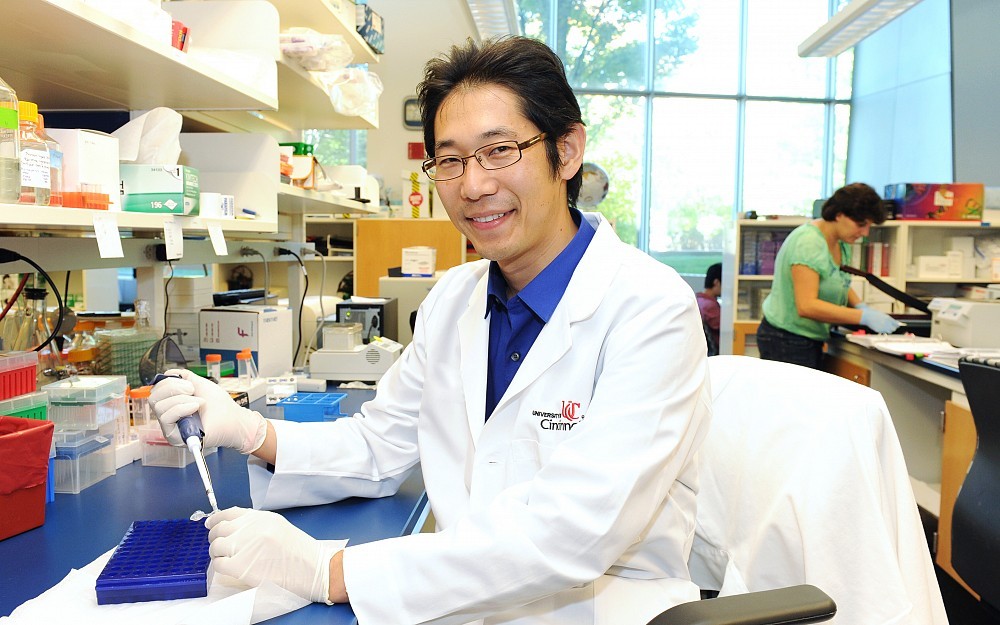
Focus On Faculty with Atsuo Sasaki, PhD
With support from the Harold C. Schott Foundation, in 2011 the UC Brain Tumor Center launched the Brain Tumor Molecular Therapeutics Program, a unique translational research effort aimed at understanding the biological mechanisms of cancers spread to the brain and developing more effective ways to treat the condition. The effort is a partnership between the University of Cincinnati Neuroscience Institute and University of Cincinnati Cancer Institute. A core component of this program was recruiting a sub-specialized team of scientists who would specifically study brain metastasis. Atsuo Sasaki, PhD, joined the UC College of Medicine Department of Internal Medicines hematology oncology faculty in July to lead innovative research for brain metastasis.
Sasaki most recently served as an instructor of medicine at Harvard Medical School in Boston. He completed his doctoral training at the Kurume Medical University in Japan. When he was selected for the Japan Society for Promotion of Sciences Special Research Fellowship and Fellowship for Young Scientists, he moved to the United States to complete postdoctoral research projects at University of California San Diego and then Harvard Medical School.
The UC College of Medicine recently selected Sasaki to represent the institution in the Pew Scholars Program in Biomedical Sciences for 2013. Here, Sasaki talks about what motivated him to establish roots in Cincinnati among the several offers from prominent institutions in the traditional east- and west-coast hubs for science.
What was appealing to you about the University of Cincinnati?
"The unique collaborative nature of the UC Brain Tumor Molecular Therapeutics Programas well as the existing research partnerships between the College of Medicine and Cincinnati Childrens Hospital Medical Center Im very excited about that synergy.
The interconnected resources and research supports that exist at UC are absolutely outstanding. I want to take full advantage of this position. I will be integrated into the UC Brain Tumor Center Tumor Board and the neural tumors and metabolic research programs at Cincinnati Childrens. This bridge between research and patient care and the multidisciplinary approach is critical for us to truly make progress in new therapeutics for cancer.
Tell us about your research focus. How did you become interested in this area?
"In our world, there are major currencies, such as U.S. dollars and the euro. Economic balance is important for our life. In our cells, there are energy currencies, such as ATP (adenosine tri-phosphate) and GTP (guanosine tri-phosphate), which are required for all biological activity.
Aberrant regulation of these energies is linked to diseases such as cancers and metabolic syndromes. However the regulation of GTP energy has largely remained unclear. My laboratory investigates how cells monitor GTP-energy levels and control cellular activity. We are in the beginning of uncovering a novel system for GTP-energy regulation and our preliminary data suggests that the system we found is a critical factor for cancer and metabolic diseases. We will specifically be looking at how this applies to brain metastasis."
Science is often a slow process. What keeps you motivated?
"Basic researchers are always asking questions. We are constantly formulating hypotheses. Most of the time, they are wrong. But maybe once or twice in 100 times, we hit truth. That is always a beautiful and unexpected break. The exhilaration of the potential breakthrough is motivational. And then to take that finding and work to apply it to human health is very rewarding and serves as a strong motivator.
The answer is there in front of us. We just need to visualize how we will get there. The driving force behind progress in research is collaboration and idea sharing through interactions with other people.
Related Stories
Can new rules in Ohio address a pharmacy staffing shortage and...
May 17, 2024
The University of Cincinnati's Michael Hegener joined WVXU's Cincinnati Edition to discuss recent rules released by the Ohio Board of Pharmacy designed to address pharmacy staffing.
Is ketamine the answer to treatment-resistant depression?
May 16, 2024
The University of Cincinnati's Stephen Rush joined WVXU's Cincinnati Edition to discuss the use of ketamine and esketamine to treat treatment-resistant depression.
UC study: Severe ischemic strokes rare in total patient...
May 15, 2024
The University of Cincinnati’s Yasmin Aziz will present research at the European Stroke Organisation Conference that found severe ischemic strokes with the most severe damage are rare in the total stroke patient population.
